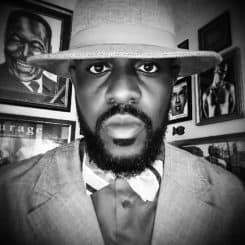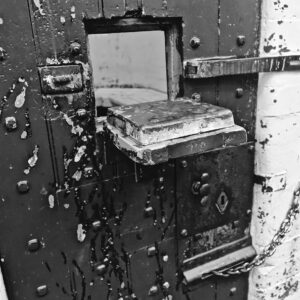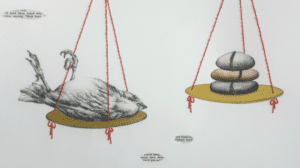
Editor’s Note: This is the second installment in a two-part series. You can read the first installment here.
Michael W. Waters is a pastor and activist in Dallas, TX and the author of the book Stakes is High. In addition to reviewing the book, I wanted to chat with Michael because in reading the book, I immediately felt a kinship with him—we are of the same generation and connect to both culture and faith as a source of identity and activism.
I was able to catch up with Michael by phone in May, and I’ve captured some of that conversation here. The killing of 15-year-old Jordan Edwards, the young man killed by police officers in Dallas, TX while leaving a party with his brother and cousins on April 29, 2017, was fresh in our minds during our talk.
Micky: What do you think is unique about the awakening to justice of people at the intersection of Generation X and Millennials—especially Black folks, whom I refer to as the Cosby Show generation*?
Michael: I do think there is an awakening; specifically, I think it is in middle/upper middle class Black folks. There is a stark difference between middle class and poor folks; the Cosby show was not the experience of the poor and vulnerable Black and Brown folks. They were feeling the brunt of mass incarceration and drug wars. Those who believed in respectability politics were the ones who lived it.
There has been an awakening among middle class that there was more going on. The American Civil Rights Movement was of benefit to those who could access some mobility and move to the suburbs and white communities. And unfortunately, there is some self-hate mixed in, too—whiteness was considered normative and better. Some Black people perceived advancement as the ability to leave Black communities, and left behind the most poor and vulnerable to fend for themselves. They may have moved back over the years for the heritage, but beyond going back to a family estate or a church home, they’ve neglected to be involved in the daily lives of the people that were struggling. The rude awakening now is that suburban life is not enough to defend you from the power of racism. And the surprise is that racism can still affect you in numerous ways. Now, we have an opportunity to reconnect and to realize that our destinies are interwoven.
The rude awakening now is that suburban life is not enough to defend you from the power of racism.
Like Joshua crossing Jordan river, the work of the Israelites was not completed until all got across. We aren’t finished until no one is left behind, and we’ve left some behind. Also, they [vigilantes and police officers/state agents] are killing our children, and when you look at the kids who are dying, their parents are our peers. When your children are threatened it wakes you up.
We often accuse white people of appropriation, but when it comes to hip-hop [see Part One for how this relates] we have to realize there was some Black appropriation of the struggle of the poor and vulnerable. This struggle provides hope, and it is an expression of all they are going through. The truest essence of the art form is being a voice for the marginalized and providing a direction of hope—but it was the colonized, commercialized version of hip-hop and rap that took hold.
Micky: As a pastor in Dallas, where the murder of a Black child recently caught the nation’s attention, what if anything is unique to Dallas that allowed this to happen, and what about it is systemic to the nation?
Michael: One thing that I’ve taken this moment to tell people is that while Jordan Edwards’s name is highlighted in this moment, the names in Dallas stretch over a lengthy history. Since the 1980s, Dallas has led the nation in police brutality. Mothers Against Police Brutality is an organization that does amazing work, and they say Dallas is number three in the nation in reported incidents of police brutality. At the same time, Dallas has a false public narrative of unity and harmony. The July 7th tragedy cracked this false narrative that Dallas was a place of unity with a partnership between community and police.
The reality is, 1973 was the last year a police officer was convicted of police brutality in Dallas. And there have been many incidents between then and now. A week before Jordan was killed, the police officers who ran over and tortured a man named Fred Bradford, Jr. were acquitted. Reports were falsified when Officer Burgess was arrested, and still a jury found him not guilty. There are countless examples of unarmed people being shot in the back [in Dallas]. Most have gone unreported in both local and national news. Jordan’s death provides an opportunity for justice beyond just his tragedy. It has grabbed the attention of the world, and hopefully in seeking justice for him, we would seek it for others who have also lost loved loved ones.
Jordan’s family asked that there would be no demonstrations before the funeral, and that was respected. At my church, I hosted a city-wide nonviolent direct action training, and a vigil that was approved by the family. There will still be protests, but the activists here have been respectful to the family. I don’t think anyone can stop protests in a case like this, but Jordon’s family recognizes that protest is not enough—whatever we do, we need to be ready to be engaged for the long haul. The police officer in this case, who is also a father and veteran, is already claiming PTSD as reasoning for shooting into the vehicle, and that could be an effective defense.
…whatever we do, we need to be ready to be engaged for the long haul.
The Dallas chapter of Mothers Against Police Brutality is spotlighting the issue of the levels of drug abuse among officers—specifically steroid abuse, because it impacts judgement and is related to high rates of domestic violence. And there is not as much of a premium on psychological evaluations [for police officers] especially over the course of their lives. They should be evaluated periodically, and they don’t get that for the most part. This places all involved in a perilous situation.
And let’s not dismiss that the first thing [after Jordon’s death] was to promote a false narrative. They did correct it fairly quickly, but before they knew anything they were immediately willing to go with the officer’s narrative. After the video, the department changed their story, because they knew it could be challenged. Additionally, Officer Roy Oliver** was not alone, and not the only one complicit. Every officer involved in Jordan’s death, the department and the officer who pulled the trigger, must answer for justice for what they did or did not do that night.
The McKinney pool incident, the “Clock Kid”, Jacqueline Craig and Christian Taylor are all recent police brutality cases in the suburbs where the police narrative did not place any fault with the officers—so what’s different here? People are talking about it, things are coming to light because of this one arrest. We cannot rest. It is a time of trying to sway public opinion.
Micky: So what are differences you see, in this moment right now?
Michael: There are two areas of difference I’m seeing right now. One, this year has been so Trump heavy, and this is the first major police brutality incident to capture the national imagination. And two, this is the death of a young person. To add to the narrative, he was a “good kid.” No one deserves to be killed like that, but Jordan was an A-student, a star athlete…and that has pushed forth the narrative that something is terribly wrong. [The public] see him as an innocent victim.
Micky: You’ve blogged about death after death of Black people in the United States, and the demonization of Black victim time after time…how do you pick up the pen and write after each new hashtag? Do you write out of a variety of emotions? At the prompting of the Spirit? As therapy or prayer?
Michael: It happens on several levels for me. I don’t consider myself a writer in the traditional sense; I am not someone with the daily discipline of writing. When I write something—a sermon, chapter or post—it comes out of inspiration…something is suddenly there that I have to get out. On occasion I have an opportunity to get it out to the world. I write largely because I have to, and because it pours out of me as a spiritual discipline. Once compelled, I get it out and sometimes it is just for me and sometimes to share.
What keeps me going? The pain of the people. The idea of being proximate to pain. I have to be a consistent voice for those who are feeling the pain around me. I don’t have the luxury of taking a day off because of where I live, where my churches are and where I work—I see the pain from the past and the present. That motivates me to think about the work I do, which is different than a soup kitchen or clothing drive (which is something practical that our church does), because my work is also about the deeper well that feeds the inequalities in the world and are the result of intentional action or inaction.
When I see poverty, I don’t just see poverty. I see the legacy of destroying the capitals of Black wealth, of redlining and lynching for properties…when I see political power I think about gerrymandering and the historical shut-out of political participation…when I see educational problems in the local high schools that have no science equipment, I see the larger issues of educational disparities that need to be drawn out and drawn into the light. I see that all of this is by design and that’s where our work begins—expanding the conversation about what is taking place on multiple levels. I also try to make the historical connections so that people can see these justice issues not as outliers, but part of embedded U.S. systems.
Micky: Why should people read your book? What will it help them understand, or what will it help them be inspired to do?
Michael: Especially for largely white and/or upper-income class folks coming into an awakening of their own, folks who are concerned that they don’t misstep and who want to be faithful to the work of justice, what I have heard back from them is that they cannot read this book lightly or without processing it. It is designed to be a quick read, but they found themselves having to put it down, process and deal with the emotions that it brought up for them. They often say, “I knew things were bad; I didn’t know they were that bad. I didn’t know all the history.”
I encourage people to have the courage not to look away. When I speak to churches, I encourage them to bring forth narratives, and tell them that we must together challenge people not to look away—to be the hope they are looking for. It’s what connects it all. At the end of the day, a great part of my writing is to wake people up to the reality that they are the hope they are seeking. It will take their hopeful and courageous action to make things happen. We have to believe in the Spirit of God, but faith and belief without works is dead. We will begin to see the changes that come from action when we join with the Spirit. Those who are coming into this realization become truly “woke,” and are inspired to do something about it.
I encourage people to have the courage not to look away.
Several congregations are using Stakes is High as a book study, and there are some national groups that are sending the book into prisons for engagement with caged folks, to participate in reading and dialogue. At least one mosque that I know of is engaging with the book; I’ve also heard from Jewish communities and “nones” doing book clubs around it. It’s very humbling to see how it is being used.
Sojourners named Stakes is High a New & Noteworthy book, and the entire Sojourners board has read it. I have spoken at many churches as part of a book tour, and it was even a part of the commemoration of the L.A. Riots during special activities at several L.A. churches. I continue to visit seminaries and universities, and I am still booking dates and would love to visit more congregations.
Many people are using the book to motivate and direct their future work. Several scholars and pastors came together to write a companion guide, which is available for free on my website or from Chalice Press, so there are a lot of ways to engage the stories and ideas in the book—whether you hear me speak in person or not.
Micky: Taking inspiration from hip-hop, I have to ask you to freestyle just a bit! Tell me about your inspiration for your life and work.
Michael: I’ve taken inspiration from Tupac, whom I consider one of the greatest theologians of our time. As Tupac said: “I might not change the world, but I will spark the brain of the one who will.” My hope is that maybe someone will be inspired to become part of the movement that will change the world forever—to step up and change the world.
My greatest inspiration is the children. The children focus our work, strengthen and guide our work, and my wife and I pray that our children will see the fruit of our labor.
Micky ScottBey Jones—the Justice Doula—is a womanist contemplative activist, healer, nonviolent direct action organizer and consultant who facilitates conferences, workshops, pilgrimages, retreats and online conversations. She writes and speaks on a variety of topics including healing justice, communal self-care, contemplative activism, intersectionality and theology from the margins. Micky has an M.A. in Intercultural Studies and is an Associate Fellow of Racial Justice with Christians for Social Action. She is the Director of Healing Justice at Faith Matters Network based in Nashville, TN. Micky was named one of the Black Christian leaders changing the world in Huffington Post. You can interact with her work and collaborations at MickyScottBeyJones.com.
*I am referring only to the cultural phenomenon of the Cosby Show and spin-off A Different World, not the man Cosby himself, who now leaves behind a tarnished legacy and an apparent long history of sexual assault victims. This micro-generation (of all races and ethnicities) is now being referred to by some as the Xennials.
**Officer Oliver has been charged in relation to Jordan’s killing and is out on bail. There were no drugs or alcohol found at the party that the teens were leaving.


